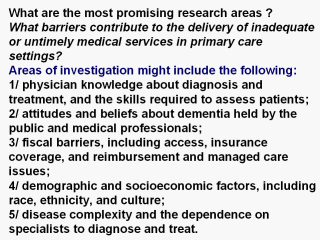| front |1 |2 |3 |4 |5 |6 |7 |8 |9 |10 |11 |12 |13 |14 |15 |16 |17 |18 |19 |20 |21 |22 |23 |24 |25 |26 |27 |28 |review |
 |
What is the relationship between aging and the
increasing prevalence of AD, and how do genetic, environmental, social and
ethnic factors interact in the etiology of disease? How early and accurately can AD be diagnosed, and what are the most effective measures to use, including cognitive tests, behavioral assessments, neuroimaging and genetic tests? What AD research is being carried out outside the US ? Longitudinal followup to determine whether early diagnosis affects outcome should be incorporated in the study design. Which current and investigational therapies most effectively delay, halt, or mitigate cognitive and behavioral deterioration? What are the relative costs and benefits of current and newer interventions? Areas of investigation might include: 1/ the merits of long-term use of cognition-enhancing pharmacologic therapies; 2/ the benefits of psychosocial therapies to maximize functioning and quality of life; 3/ the cost-effectiveness of chronic care programs, including home care, adult foster care, assisted living, nursing home, special care units and other long-term care; 4/ interventions that reduce the risk of caregiver depression and improve tolerance and the capacity to care for patients in the home, including educational materials, counseling, support groups, day care and respite care. |